|
|
|
Sort Order |
|
|
|
Items / Page
|
|
|
|
|
|
|
| Srl | Item |
| 1 |
ID:
156651
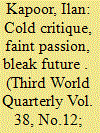

|
|
|
|
|
| Summary/Abstract |
This article carries out a psychoanalytic critique of Post-Development, arguing that the latter’s inattention to the unconscious underpinnings of power not only leaves it unable to explain why development discourse persists, but also deprives it of a radical politics, resulting in a surrender to global capitalism. Drawing on the work of Escobar, Ferguson and Esteva, the article valorises Post-Development’s important insights on the production of development discourse and its attendant power mechanisms. But using a Lacanian lens, it also probes Post-Development’s failure to address how power is mediated at the level of the subject: in maintaining that (capitalist) development is produced discursively in a cold, impersonal way (like an ‘anti-politics machine’), Post-Development ignores the fact that such power is only able to take hold, expand and, crucially, persist through unconscious libidinal attachments (e.g. desires, enjoyment). This failure leaves Post-Development with few resources – beyond localised resistance (Escobar, Esteva) or the call for a universal basic income (Ferguson) – to address the structural challenges of global capitalism. Psychoanalytically speaking, such a (Left) position appears to manifest a secret desire that nothing too much must change: Post-Development may well criticise the disciplinary mechanisms of neoliberal development, but ultimately it engages in an unconscious acceptance of capitalism.
|
|
|
|
|
|
|
|
|
|
|
|
|
|
|
|
| 2 |
ID:
192308
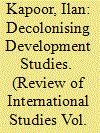

|
|
|
|
|
| Summary/Abstract |
This article explores ways of decolonising Development Studies by: (1) examining the discipline’s tendencies towards what some have called ‘imperial amnesia’, that is, proclivities towards disavowing if not erasing European colonialism, most evident in 1950s–1960s Modernisation theory, but also more recently in the work of such analysts as Bruce Gilley and Nigel Biggar; (2) considering the opportunities and perils of ‘epistemic decolonisation’, that is, ways of decolonising knowledge production in the discipline, including the limits of ‘non-Eurocentric’ pedagogies; and (3) reflecting on forms of material decolonisation (e.g., the reduction of socioeconomic inequalities by improving better access to education or resisting the corporatisation of publicly funded research) that need to accompany any epistemic decolonisation for the latter to be meaningful.
|
|
|
|
|
|
|
|
|
|
|
|
|
|
|
|
| 3 |
ID:
066954
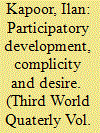

|
|
|
| 4 |
ID:
134636
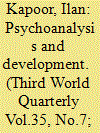

|
|
|
|
|
| Summary/Abstract |
International development has tended to ignore – or, tellingly, repress – human/social passions. Yet the theory and practice of development is replete with disavowed memories (racism, (neo)colonialism, gender discrimination) and traumatic prohibitions (economic recession, poverty), which show up in dreams and fantasies (the exoticised Third World, structural adjustment as universal panacea), obsessions (economic growth, ‘wars’ against poverty or terror), or stereotypes (denigration, infantilisation, sexualisation or feminisation of the Third World Other). Psychoanalysis aims precisely at helping tease out these passions, that is, the unconscious fantasies and desires embedded in development. It helps explain the gap between development’s scientific commitments (eg belief in progress, neutrality, objectivity, rationality) and its irrational practices (eg the seductive draw of narrow capitalistic growth, the fatal pull to aggressive racism, or the blind conformity to bureaucratic procedures or ethnic/religious identities). It helps us understand that development is not only a socioeconomic construction, but also an ideological construction intent on effacing its various internal traumas and contradictions – for example, the way in which development is “naturally” equated with neoliberal growth and liberal democracy, concealing the reality of rapacious capitalism, growing global inequalities and unevenness, and diminishing avenues for political contestation. The five articles in this sub-theme for Third World Quarterly aim to examine the intersection of psychoanalysis and development, applying in particular (although not exclusively), a Lacanian/Žižekian lens to a range of development issues.
|
|
|
|
|
|
|
|
|
|
|
|
|
|
|
|
| 5 |
ID:
134637
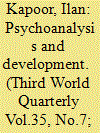

|
|
|
|
|
| Summary/Abstract |
This article examines the contributions of psychoanalysis to international development, illustrating ways in which thinking and practice in this field are psychoanalytically structured. Drawing on the work of Lacan and Žižek, the article will emphasise three key points: (1) psychoanalysis can help uncover the unconscious of development – its gaps, dislocations, blind spots – thereby elucidating the latter’s contradictory and seemingly ‘irrational’ practices; (2) the important psychoanalytic notion of jouissance (enjoyment) can help explain why development discourse endures, that is, why it has such sustained appeal, and why we continue to invest in it despite its many problems; and (3) psychoanalysis can serve as an important tool for ideology critique, helping to expose the socioeconomic contradictions and antagonisms that development persistently disavows (eg inequality, domination, sweatshop labour). But while partial to Lacan and Žižek, the article will also reflect on the limits of psychoanalysis – the extent to which it is gendered and, given its Western origins, universalisable.
|
|
|
|
|
|
|
|
|
|
|
|
|
|
|
|
| 6 |
ID:
141135
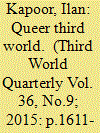

|
|
|
|
|
| Summary/Abstract |
This article attempts to align ‘queer’ and ‘Third World’ – grouping them in their common inheritance of subjugation and disparagement and their shared allegiance to non-alignment and a politics aimed at disrupting domination and the status quo. In assembling both terms one is struck by how, in the mainstream discourse of international development, the Third World comes off looking remarkably queer: under Western eyes it has often been constructed as perverse, abnormal and passive. Its sociocultural values and institutions are seen as deviantly strange – backward, effete, even effeminate. Its economic development is depicted as abnormal, always needing to emulate the West, yet never living up to the mark (‘emerging’ perhaps, but never quite arriving). For their part, postcolonial Third World nation-states have tended to disown and purge such queering – by denying their queerness; indeed often characterising it as a ‘Western import’ – yet at the same time imitating the West and pursuing neoliberal capitalist growth. I want not only to make the claim that the Western and Third World stances are two sides of the same discourse but, drawing on Lacanian queer theory, also to suggest that a ‘queer Third World’ would better transgress this discourse by embracing queerness as the site of structural negativity and destabilising politics.
|
|
|
|
|
|
|
|
|
|
|
|
|
|
|
|
|
|
|
|
|